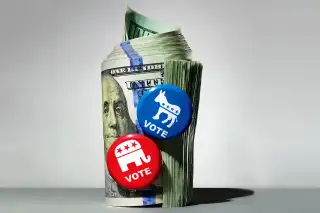Which Candidate Is Best for Your Portfolio?

The choices are stark enough. On the one hand, you have Democrats trying to encourage long-term investments by penalizing short-term trading. Right now the top capital gains tax rate is 20%, plus a 3.8% investment income surtax for some taxpayers, as long as they wait a year to sell. For investors in the top 39.6% income-tax bracket—and only them—Hillary Clinton now wants a holding period of at least six years to get that beneficial rate. For sales within two years, their gains would be taxed at ordinary income rates, with lower rates then phasing in.
Bernie Sanders, to Clinton’s left, has spoken about raising the capital gains tax rate along with dividend taxes. He also wants a “financial transaction tax,” equivalent to a sales tax on stock and bond trades.
Republicans, on the other hand, seek to boost investment by cutting taxes. Donald Trump and Jeb Bush would eliminate the surtax. Going one step further, Ted Cruz calls for slashing cap gains and dividend taxes to 10%, while Marco Rubio proposes eliminating them altogether.
Read Next: Who Really Dug Us Out of the Great Recession?
Who wins the presidential race, though, may ultimately matter less to your portfolio than does the overall makeup of Washington. Whoever the President is, “it’s not going to be easy to deliver dramatic legislation,” says Zachary Karabell, head of global strategy at investment firm Envestnet. That’s in large part due to gridlock.
S&P analyzed how equities performed under partial gridlock (the White House is controlled by one party, Congress by the other), total gridlock (Congress is split), and unity (one party wins it all). In general, stocks delivered the best gains with total unity—averaging 11% annual price gains regardless of which party is in the driver’s seat. Total gridlock, on the other hand, was the worst, with the S&P 500 up just 6.9% a year.
The most likely unity scenario would be the GOP winning the White House and holding the Senate. (It controls the House by a wide margin.) Should a Democrat win, he or she will probably face a Republican-held Congress. Now here’s the twist: That particular combo produced even better results than total unity, with an average 13.6% gain.
What to do: Vote with your head or with your heart, but resist the urge to remake your portfolio based on your politics. History says your investments can generate positive results no matter who the President is.